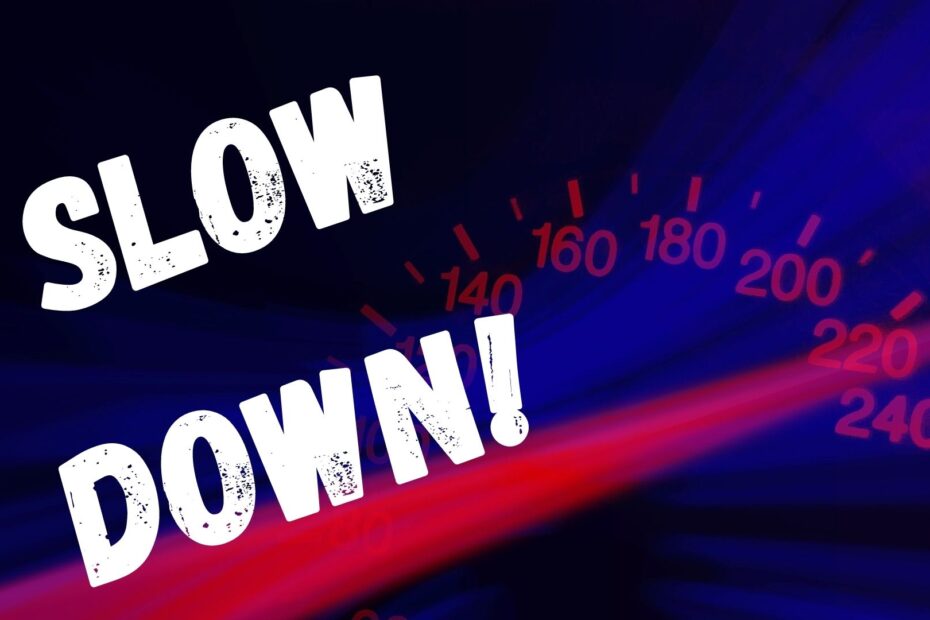Let’s start this with a confession: I’m a fast talker.
It goes back to an experience I had in elementary school. I thought I was going to have to recite something with a group of other kids but found myself all alone on the stage. The obvious way for me to end my moment in the spotlight was to rush through it as quickly as possible. I still recall a teacher commenting that she had never heard it said so quickly.
The reality is that many of us talk quickly and there are plenty of different reasons. Like my grade school experience, you may be so nervous that you want to race through the content so that you can sit down and be done with it. Or you might have crammed too much content into your presentation and now you’re having to rush to get through everything.
The problem is that talking quickly may accomplish your immediate goal, you lose out on something bigger. You were invited to speak because someone wanted to hear your expertise and insight. You might have volunteered because it was a great opportunity to talk about your project or goals. Unfortunately, your rapid banter was likely both confusing and distracting.
Before you say that you’ve been doing it that way for a long time and it’s not likely to change, I want to suggest that it can. I’m walking (and talking) proof. While my natural tendency is to speak quickly, I’ve worked hard at slowing myself down. I’ve managed a successful television and speaking career so I know it can change. Yes, you’ll have to work at it, but the result can be very rewarding.
If you’d like to go slower and have more impact, I’ve got four steps that I think could help. I call it PREP. It stands for:
- Practice
- Relax
- Enunciate
- Pause
Practice is an obvious place to start. That’s because the more you practice the material, the more comfortable and confident you are when you deliver. While you’re practicing, it’s very important that you time yourself. You need to figure out exactly how much information you can put into the time you have allotted. Once you take out the extra material, you can relax knowing that you won’t have to rush.
In fact, the second letter, R, stands for Relax. There are two good reasons why you should be relaxed. One is that the people listening to you are actually rooting for you. They could be your coworkers or your managers, but even the people you don’t know want you to do well when you’re speaking in front of them. Number two, remember that you’re there because you have the information. You’re the expert. They brought you there because they want to listen to you. That alone should boost your confidence and help you relax. This is especially important for people who have a fear of public speaking.
The E stands for Enunciate. The more you enunciate your words, the slower you’re going to go. Of course, don’t get carried away. You don’t want you to drag out every syllable. But if you enunciate, your pace is going to naturally slow down. Plus, you are going to be clearer and easier to understand.
The final P stands for Pause. Every now and then in your presentation, take a moment to pause. That pause will do several things. First, it slows down your pace. Second, it gives your brain a chance to think about where you’re going next. That will help reduce the nervous feeling that you’re spiraling out of control. And finally, that pause gives you a chance to make a point. Adding a pause before saying something significant grabs the audience’s attention.
Don’t expect instant results. I can still talk too quickly if I’m not careful. My wife is the one who regularly reminds me to watch my pace. You can write something on your notes, or even send a calendar reminder before the meeting to slow down.
You’re speaking for a reason. It might be an important sales presentation or just a project update. Whatever the purpose, you want to make sure that people are thinking more about your content than the speed at which you’re talking. So remember these four public speaking tips: Practice, Relax, Enunciate and Pause. It could slow down your pace, and increase your impact!
Rick DeBruhl is a communication coach and consultant. Please call 602-888-3479 to learn more about how Rick can help you communicate successfully.

